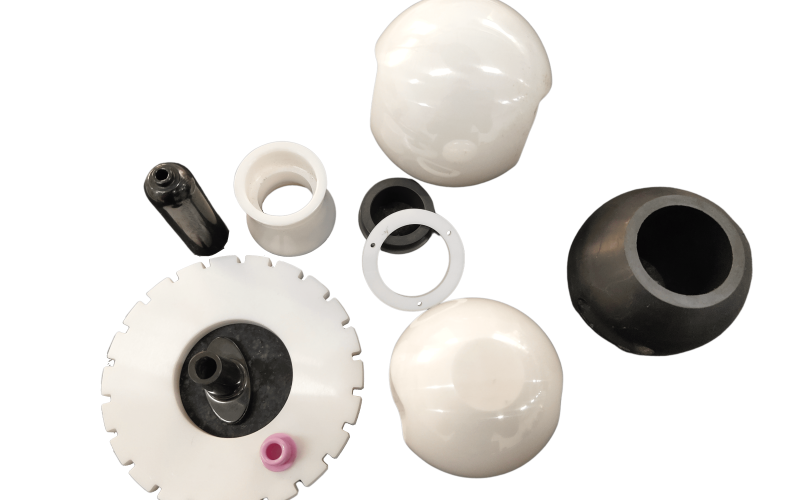Table of Contents
Wow! Did you know advanced ceramic materials can handle heat hotter than lava and are used in spaceships? These amazing materials are changing the world, from cars to medical tools. At Eshino Precision, we make these super tough ceramics, and we’re excited to share everything about them!
| Feature | Why It’s Awesome |
|---|---|
| Heat Resistance | Up to 2400°C, tougher than metal! |
| Strength | Super hard, perfect for tools. |
| Uses | Airplanes, phones, and medical implants! |
| Market Size | Over $124 billion in 2025! |
Introduction
What Are Advanced Ceramics?
Hey, have you ever wondered what makes spaceships or fancy electronics so strong? It’s advanced ceramic materials! These are special materials that can handle crazy heat, tough chemicals, and heavy jobs. Unlike regular ceramics like plates or vases, advanced ceramics are made for high-tech stuff like airplane engines and medical implants.
Why They’re a Big Deal
The market for advanced ceramic materials is growing super fast. In 2025, it’s worth over $124 billion, and it’s expected to keep growing by 10% every year! Why? Because industries like electronics and cars love how tough these ceramics are. At Eshino Precision, we’re experts in making these materials work for you!
What You’ll Learn
In this guide, we’ll explain what advanced ceramic materials are, their types, and how they’re used. Plus, we’ll share cool examples and answer questions you might have. Ready to dive in? Let’s go!

What Are Advanced Ceramic Materials?
The Basics
Advanced ceramic materials are like superheroes of the material world! They’re made from special powders, not clay like regular pottery. These ceramics are super strong, can handle high heat, and don’t break down in tough places. You’ll find them in things like ceramic rods or seals at Eshino Precision.
How They’re Different
Regular ceramics are great for cups or tiles, but they’re not tough enough for big jobs. Advanced ceramic materials are built to last in crazy conditions, like in chemical plants or chip-making machines. They’re made with science to be extra strong and useful.
Why They Rock
Dr. Maria Gonzalez, a materials expert, says, “Advanced ceramic materials are key to modern tech because they’re so tough and versatile.” At Eshino Precision, we use these ceramics to make parts that never quit. Want to know more? Check out our guide on structural ceramics.
Types of Advanced Ceramic Materials
Oxide Ceramics
First, there are oxide ceramics like alumina and zirconia. Alumina is super hard and used in electronic substrates. Zirconia is tough and great for medical seals.
Non-Oxide Ceramics
Next, non-oxide ceramics like silicon carbide and silicon nitride are awesome for heat. Silicon carbide is used in tubes for hot machines, while silicon nitride is perfect for car parts.
Other Cool Types
Then, there are carbides like tungsten carbide for cutting tools. Also, functional ceramics can make electricity from pressure, used in sensors. Here’s a quick look:
| Material | Superpower | Best For |
|---|---|---|
| Alumina | Super hard | Electronics, tools |
| Zirconia | Really tough | Medical, sensors |
| Silicon Carbide | Handles heat | Engines, tubes |
| Silicon Nitride | Shock-resistant | Cars, bearings |
Key Properties of Advanced Ceramic Materials
Super Strong
Advanced ceramic materials are crazy hard! They resist scratches and wear, making them great for tools. But, they can crack if hit hard, so we design them carefully at Eshino Precision.
Heat and Electricity Powers
These ceramics can take heat up to 2400°C—hotter than most metals! Most don’t conduct electricity, which is awesome for electronics. Some, like silicon carbide, can conduct it, though. Learn more in our heat resistance guide.
Chemical Shield
Also, advanced ceramic materials don’t get eaten away by acids or chemicals. This makes them perfect for tough factories and medical tools. Check out our corrosion guide.
Applications of Advanced Ceramic Materials
Flying High in Aerospace
Advanced ceramic materials are superstars in airplanes! For example, silicon carbide is used in turbine blades because it handles crazy heat. Also, ceramic coatings protect spacecraft from burning up. These materials make flying safer and cooler!
Zooming in Cars
In cars, advanced ceramic materials like silicon nitride are used in bearings and engine parts. They’re light, so cars use less gas. Plus, they last a long time, which saves money. Check out our car ceramics guide.
Electronics and Medicine
Next, electronics love alumina for insulating computer chips. In medicine, zirconia makes strong implants. These ceramics are safe for your body and super tough!
Energy and Defense
Finally, advanced ceramic materials help green energy with fuel cells and solar panels. In defense, boron carbide makes lightweight armor. Want more? Read about ceramic uses.
Advantages of Advanced Ceramic Materials
Better Than Metal
Why pick advanced ceramic materials? First, they’re way better than metals in hot places. They don’t melt or rust, even in chemical plants. Also, they’re stronger than plastics and don’t bend. Learn more in our advantages guide.
Saves Money
Another big win is that advanced ceramic materials last super long. This means less fixing or replacing parts, which saves cash. For example, using ceramics in car engines cuts repair costs. See our cost-saving blog.
Special Powers
Plus, these ceramics can block electricity, which is great for electronics. They’re also safe for medical tools. Dr. John Lee, an engineer, says, “Advanced ceramic materials give us unique solutions for tough engineering problems.” Check out zirconia benefits.
How Advanced Ceramic Materials Are Made
Starting with Powder
Making advanced ceramic materials is like baking a super strong cake! First, we mix special powders, like alumina or silicon carbide. Then, we shape them into parts like rods or tubes.
Cooking and Shaping
Next, we heat the parts in a super hot oven called a kiln. This process, called sintering, makes them rock-hard. Sometimes, we use injection molding for tricky shapes. After that, we polish them to be perfect.
Making It Perfect
At Eshino Precision, we check every step to make sure our advanced ceramic materials are top-notch. This is super important for things like seals. Want details? Read our manufacturing guide.
Market Trends for Advanced Ceramic Materials
Growing Super Fast
The market for advanced ceramic materials is huge! In 2024, it was worth $112.86 billion, and by 2025, it’ll hit $124.48 billion, growing 10.3% every year. By 2034, it could reach $300.81 billion! Why? Because electronics and airplanes need these ceramics.
What’s Driving It
For example, India’s electronics market is expected to hit $520 billion by 2025. Also, more planes are being built, and green energy is growing. These all need advanced ceramic materials.
| Year | Market Size | Growth Rate |
|---|---|---|
| 2024 | $112.86 billion | – |
| 2025 | $124.48 billion | 10.3% |
| 2034 | $300.81 billion | 10.3% |
Why It’s Exciting
This growth means more chances to use advanced ceramic materials. At Eshino Precision, we’re ready to help! See how ceramics are changing industries in our industry blog.
Challenges in Using Advanced Ceramic Materials
They Can Break
Advanced ceramic materials are super tough, but they can crack if hit hard. This is called brittleness, and we fix it with smart designs. Learn more in our brittleness guide.
Costs and Tools
Also, making these ceramics is pricey because the materials and machines are special. Shaping them needs fancy tools, too. We explain how we handle this in our CNC machining guide.
Keeping Quality High
Finally, making sure every piece is perfect is hard but super important. At Eshino Precision, we test everything to keep quality top-notch. Read about this in our reliability blog.
The Future of Advanced Ceramic Materials
New Tech
The future of advanced ceramic materials is awesome! Tiny ceramics called nanoceramics are coming, and 3D printing is making cool shapes. These will make parts even better! Check out our tech blog.
New Uses
Also, ceramics are being tested for batteries and medical tissue. This could change how we power cars or heal people. It’s super exciting!
Helping the Planet
Plus, advanced ceramic materials last a long time and can be recycled. This makes them great for the environment. Learn more in our sustainability blog.
Real-World Examples of Advanced Ceramic Materials
Space Adventures
NASA uses advanced ceramic materials in spacecraft heat shields. These ceramics keep spaceships safe from burning up! It’s like a superhero shield for space.
Healthy Smiles
Tech Power
In electronics, alumina substrates help make tiny, fast chips for phones. See more in our custom parts guide.
Common Questions About Advanced Ceramic Materials
What are advanced ceramic materials used for?
They’re used in airplanes, cars, electronics, and medicine for tough parts.
How are they different from regular ceramics?
Unlike pottery, advanced ceramic materials are made for strength and special jobs. See our differences guide.
What are their key properties?
They’re hard, heat-resistant, corrosion-proof, and often block electricity. Check our properties blog.
Which industries use them?
Aerospace, cars, electronics, medicine, and energy love them! Read our applications guide.
Are they eco-friendly?
Yes, they last long and can be recycled. See our sustainability blog.
Conclusion
Why Advanced Ceramics Are Awesome
Advanced ceramic materials are changing the world! They’re super strong, handle insane heat, and work in airplanes, phones, and even medical implants. With a market worth $124.48 billion in 2025, these ceramics are the future!
Keep Learning
Want more? Explore our blogs on technical ceramics or custom parts. Let’s build something amazing together!
External Links
Ready to Transform Your Engineering Solutions?
No industrial challenge is too complex for Eshino. From precision ceramic rods and advanced bushings to customized nozzles and other high-performance components, we engineer solutions that combine exceptional durability, thermal resistance, and precision to meet your specific needs. Whatever your industry demands, Eshino delivers tailored expertise you can trust.

